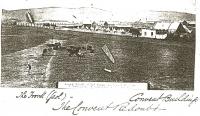
Charles Allen Du Val
His life and works
News Of The Camp
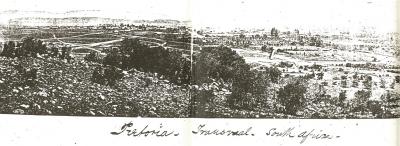
View of Pretoria in 1880
Alone in South Africa with his theatrical team, Charles Henry Du Val had arrived in in the capital of the recently-annexed Transvaal just in time to be trapped in the Siege of Pretoria.
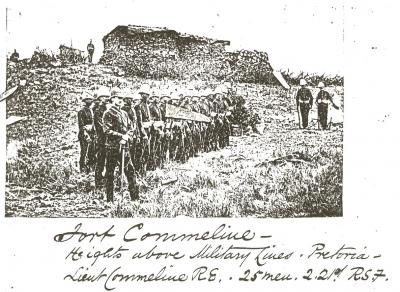
Fort Commeline
The townspeople were evacuated to the military camp. There they settled down as comfortably as they could in huts and tents, bungalows and bullock-wagons, and a system of rationing was established. Three forts also were erected, two, Forts Commeline and Tullichewan, on commanding positions to the south, and the third, Fort Royal, on the east — all being armed with small Krupp guns. The troops, under the command of Lieut.-Colonel Gildea, 2nd Battalion 21st Regiment Royal Scots Fusiliers, behaved admirably throughout the siege, which lasted for 102 days.
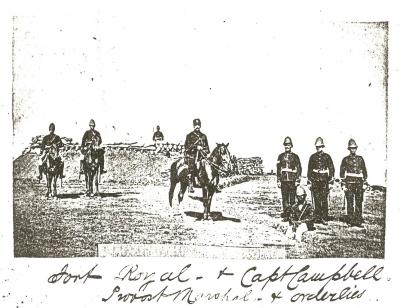
Fort Royal
Christmas 1880 was a particularly bad time for the besieged soldiers and civilians. Charles Henry Du Val vividly described the torrential rainstorms which reduced the camp to a waterlogged morass of soaking tents and bedding, where mothers tried to make the day as happy as possible for the young children.
He wrote a moving poem Christmas in Laager in which he compared their appalling plight under siege with memories of happy festivities that they had enjoyed back at home (1).
Charley Du Val detested the war, although doing his duty by enlisting as a volunteer in the hastily formed carabineers named D’Arcy’s Horse after its leader, a former Kimberley magistrate. He went out on dangerous patrols and was wounded, although that is barely mentioned in the book he wrote of his experiences, as is most of his military activity.
But not all was gloom. A spirit of good humour generally prevailed. Despite the difficult conditions, some semblance of normal life was maintained as well as could be managed. On one occasion permission was given for freemasons to leave camp temporarily, and go into the abandoned city to the deserted Masonic Hall, at no little risk, and there hold a masonic lodge meeting. Charley tells how
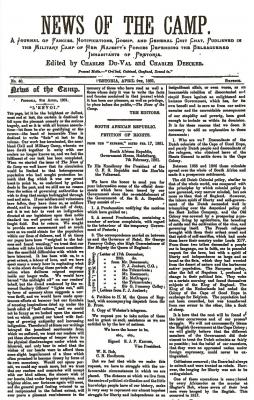
Issue No. 40 Published 9 April 1881
“the members of the Craft had to obtain permission from their various commanding officers or respective ward-masters to attend the meeting – these passes, countersigned by the Garrison-Adjutant, were granted at bearer’s own risk – the Masonic Hall of the town of Pretoria being the place of assembly. Slightly at variance with the motto of the brethren, ‘Peace, love, and harmony’, was their appearance, clad in the various costumes of war, many carrying their rifles and bandoliers, a group of horses standing outside the Hall, while the Master and officers of the Lodge went through the various rites of the ancient Craft in an apartment through which the breezes freely blew, entering a line of loopholes knocked out of the wall at one side, to escape by a similar set at the other – possibly the most novel system of ventilation that ever admitted the fresh air to participate in the mystic ceremonies of the free and accepted ones, in either Southern Africa or wherever else the maul has resounded or the compass been extended in open Lodge - the lodge was more open than usual” (2).
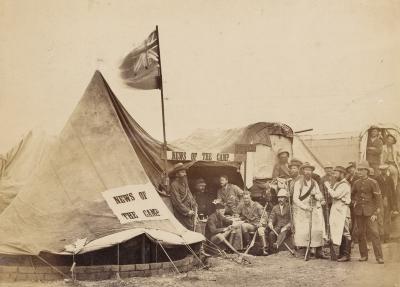
On Christmas Day 1880, The Great Entertainer published the first edition of one of the strangest newspapers ever produced. Charles Henry Du Val had become editor of a newspaper called the News of the Camp.
The first edition of the newspaper News of the Camp consisted mainly of official announcements and the promise that it would be issued three days a week. It was a peculiar situation for a travelling performer to find himself in - under siege, editor of a newspaper, and a cavalryman on active service!
Charley became an expert photographer. He grew a moustache, and so gone was any chance of playing his character Belle Dashaway. Not that performing his show was possible anyway - his props were stashed away in the soldiers’ canteen. Although theatricals were sometimes got up during quiet periods of the siege, Charley took no part in them.

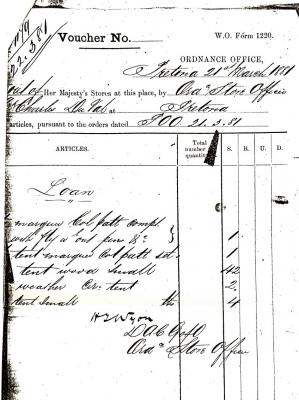
Charles Henry Du Val absolutely revelled in producing the newspaper. Editing and printing were done in a marquee that Charley had to borrow (and sign for!) from Army stores. He even managed to smuggle out a copy of one edition to his sister Lily in the Isle of Man, with his signature dated 22 November 1881 (3).
A souvenir was produced in early 1881 consisting of editions of the newspaper bound up in blue leather, with several blank pages. On them photographs could be mounted obtainable from H.F. Gros, a Swiss-born photographer who was also in besieged Pretoria. Some have survived in the Commonwealth Institute copy of News of the Camp, with descriptions hand written by Charles Henry Du Val (4).

In 1881 the British Government, to the angry disbelief of the people in Pretoria, surrendered unconditionally to the Boers, who then peacefully re-occupied the city. Charley made preparations to leave and continue the interrupted tour of his travelling show. A legal agreement was drawn and signed by which he sold all his interest in News of the Camp to his co-editor Charles Deecker for £90.
No horses could be bought, however, so he hitched four oxen to his wagon. Having retrieved his tattered props from the military canteen store, he then set off for Kimberley, where he gave a successful performance of his solo show.
After an adventurous few weeks, during which he continued giving performances to rapturous audiences, he eventually reached Cape Town. From there he took passage to England.
Charley hated war, and could write of its young casualties with telling pathos and anger:
“- amidst the most intense quietude the comrades of the bearded soldier and boy-volunteer shouldered their remains and bore them to their final resting-place - a young Carabineer, who but a few weeks before had been a clerk in the Standard Bank, lay with a bullet through his heart - Strip war of the mantle of its glories and excitements, and it will disclose a gibbering ghost of pain, anxiety, grief, disappointment, and despair.”
But he never lost his sense of fun. The story of his experiences that he later wrote is pierced with wit and humour.
Visiting the exiled Zulu king Cetchwayo, Charley was “ushered into the presence of his royal duskiness, and found him extended on a mat, an embroidered smoking cap on his head, and a blanket carelessly disposed over his body and extremities”.
On the road from Kimberley he met “a very civil engineer and a very uncivil printer”.
At the battle of Swartkopje “Thinking it probable that serious work was contemplated, I jammed one of my holsters with a tin of Oxford sausage”.
By the beginning of October 1881 Charles Henry Du Val was back home in Dublin - to write his book With a Show through Southern Africa and Personal Reminiscences of the Transvaal War, from which the above quotations are taken, and then to begin touring in England and Ireland again with his show.
(1) "Christmas In Laager". Dated 25 December 1880, the poem appears in Charley's book With a Show through Southern Africa and Personal Reminiscences of the Transvaal War 1884 (one-volume Popular Edition) at pages 186-188. With its regular beat and internal rhymes, it shows Charley's command of rhythm and scansion, and his power to depict a moving situation in verse.
(2) The description of the masonic meeting is a fuller account than the excerpt quoted by Vivien Allen in her book Du Val Tonight! The Story of a Showman (1990) on pages 100 to 101, and is from pages 247 to 248 of Charley Du Val’s book. This odd event took place towards the end of January 1881.
(3) Copies of this and all the other illustrations on this page were kindly supplied by Mark Brighton while he was expertly conserving the documents connected with "News of the Camp" then stored in the Commonwealth Institute in London. Subsequently they were transferred to Cambridge University Library Reference GBR/0115/Y3055A..
(4) H.F. Gros was an important early photographer in the Transvaal. Arriving in South Africa about 1869, he appears to have been in partnership in the firm of Weber and Gros at Bloemfontein, taking full ownership in 1872. During 1874 and 1875 he visited the Lydenburg gold fields, but was in Pretoria by 1876. He was a member of the Aurora Lodge of Freemasons in Pretoria. (The Photograficana of H.F. Gros by N. Cowan in Africana Notes and News (1979) volume 23 No. 3 pages 99-104, quoted in Cambridge University Library: Royal Commonwealth Society Library Reference GBR/0115/Y3055A.
For a collection of the press reports on Charles Henry Du Val see Charles Henry Du Val Press Cuttings.
